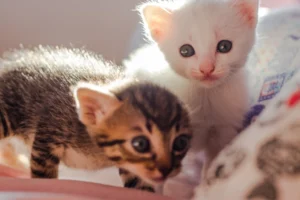Have you ever wondered why baby cats are called kittens? It’s a common question among animal lovers and pet owners alike. Let’s explore the fascinating reason behind this naming convention.
Origin of the Term “Kitten”
Have you ever wondered why baby cats are called kittens? The term “kitten” actually has a fascinating origin that dates back to the Middle English word “kitoun,” which means a young cat. Over time, this word evolved into “kitten” as we know it today. It’s interesting to see how language has shaped the way we refer to these adorable furballs.
Physical Development of Kittens
Watching kittens grow is an exciting journey filled with key milestones. From the moment they open their eyes to taking their first wobbly steps, kittens go through rapid physical development in a short period. It’s amazing to witness their transformation from tiny, helpless beings to playful, curious explorers. Just like human babies, kittens rely on their mothers for nourishment and guidance as they navigate the world around them.
- Birth: Kittens are born blind and deaf, relying on their sense of touch and smell to find their mother and littermates.
- Two Weeks: Their eyes start to open, revealing bright blue or green hues.
- Three Weeks: They begin to explore their surroundings, testing out their tiny legs for mobility.
- Four Weeks: Kittens start to play with each other, building essential social and physical skills.
- Eight Weeks: By this age, they are usually weaned off their mother’s milk and eating solid food.
Remember, every kitten develops at its own pace, so it’s essential to provide a safe and nurturing environment for their growth. Enjoy every moment as they transform from cuddly balls of fur to independent feline companions.
Behavioral Traits of Kittens
Kittens are not just small cats; they have their own unique set of behavioral traits that set them apart. These adorable furballs are known for their playful and curious nature. Unlike adult cats, kittens are constantly exploring their surroundings, chasing after anything that moves, and engaging in all sorts of antics. This behavior is essential for their development as it helps them build essential skills such as hunting and socialization.
One interesting aspect of kittens’ behavior is their fascination with anything that resembles prey. This could be a piece of string, a moving shadow, or even their own tail. By engaging in this type of play, kittens are honing their hunting instincts and improving their coordination and agility. It’s all part of their natural instincts as predators.
Another key behavioral trait of kittens is their boundless energy. They seem to have an endless supply of energy, bouncing around the house and playing non-stop. This energy is not only cute to watch but also necessary for their physical development. It’s important to provide kittens with plenty of toys and playtime to help them burn off this energy in a constructive way.
In summary, kittens exhibit playful and curious behavior that is essential for their development. By understanding and embracing these traits, you can provide the best care and environment for your tiny feline friend.
Care and Feeding of Kittens
Caring for newborn kittens requires special attention and dedication. If you find yourself with a litter of kittens, there are essential tips and guidelines to ensure they grow up healthy and strong. One crucial aspect of caring for kittens is feeding them properly.
When it comes to feeding newborn kittens, it’s important to remember that they have specific dietary needs. Kittens require a diet rich in nutrients to support their rapid growth and development. Commercial kitten milk replacer is typically recommended for orphaned or bottle-fed kittens, as it closely mimics the nutrients found in mother’s milk.
Additionally, kittens should be fed small, frequent meals throughout the day. Their tiny stomachs can’t hold much food at once, so it’s important to feed them every few hours. As they grow, you can gradually increase the amount of food and transition them to solid kitten food.
In terms of care, newborn kittens also require warmth and cleanliness. Keep their environment cozy and free of drafts, and gently stimulate them to urinate and defecate after feedings. Regular grooming is also important to keep their fur clean and free of tangles.
By following these tips and guidelines, you can provide the best care for your newborn kittens and help them thrive in their early days of life.
Popular Breeds of Kittens
When it comes to popular breeds of kittens, there is a wide variety to choose from, each with its own unique characteristics and traits. From the playful and energetic Abyssinian to the affectionate and cuddly Ragdoll, there is a breed out there for everyone. Maine Coons are known for their large size and friendly demeanor, while Siamese cats are famous for their striking blue eyes and vocal nature. Whether you prefer a fluffy Persian or a sleek Bengal, it’s essential to research each breed to find the perfect fit for your lifestyle.
- Abyssinian: Known for their playful and active nature, Abyssinian kittens love to explore and interact with their human companions.
- Ragdoll: These gentle giants are known for their relaxed and affectionate personalities, making them great cuddle buddies.
- Maine Coon: The largest domestic cat breed, Maine Coons are friendly, sociable, and often dubbed as “dog-like” due to their loyalty.
- Siamese: With their striking blue almond-shaped eyes and vocal tendencies, Siamese kittens are intelligent and social creatures.
- Persian: Fluffy and elegant, Persian kittens are calm and gentle companions, perfect for those seeking a laid-back feline friend.
- Bengal: Known for their wild appearance and energetic nature, Bengal kittens are adventurous and require plenty of mental and physical stimulation.
Adopting a kitten from a specific breed requires understanding their unique needs and characteristics to ensure a harmonious bond with your new feline friend.
Kitten Adoption and Rescue
Adopting a kitten from a shelter or rescue organization is not only a selfless act but also a rewarding experience. By giving a forever home to a homeless kitten, you provide them with love, care, and security they deserve. Shelter kittens come from all backgrounds and have their own unique stories, making them just as lovable and deserving of a chance at a happy life as any other cat.
When you adopt a kitten, you not only save a life but also make space for another cat in need. The benefits of adopting a kitten from a shelter go beyond just providing a home; you also support the important work of rescue organizations in caring for and finding homes for vulnerable animals. Additionally, shelter kittens are often spayed or neutered, vaccinated, and microchipped, saving you time and expenses associated with these procedures.
Remember, when you adopt a kitten, you gain a loyal companion who will bring joy and love into your life while also making a positive impact on the welfare of animals in need. Consider adopting your next furry friend from a shelter or rescue organization and make a difference in the life of a deserving kitten.
Fun Facts About Kittens
Kittens are absolutely adorable, but did you know they have some fascinating quirks too? For example, kittens are born with closed ear canals and their eyes closed, but they start to open within a week. It’s a true “blink and you’ll miss it” moment! Another fun fact is that kittens have a strong sense of smell, which helps them navigate the world around them. Plus, kittens are born with sharp little claws that help them climb and play. These tiny furballs are truly a bundle of surprises!
Kitten Naming Tips
Choosing the perfect name for your new kitten is an exciting task. When picking a name, consider your kitten’s personality, appearance, or even their favorite toy. Some popular naming themes include food names like Peanut or Cookie, or nature-inspired names like Luna or Willow. If you’re feeling creative, you can even choose a unique name based on a favorite book or movie character. Remember to keep the name short and easy to pronounce for your kitten to learn quickly. And most importantly, pick a name that reflects your furry friend’s special charm and personality.
Extra Tip: When naming your kitten, think of a name that will still suit them as they grow older. Avoid choosing a name that may feel awkward or out of place once your kitten becomes a full-grown cat.
Socialization and Training
When it comes to raising a happy and well-behaved cat, socialization and training play crucial roles from a young age. By exposing kittens to various people, animals, and environments early on, you help them become more confident and friendly adult cats. Positive interactions during the critical socialization period, which typically occurs between 2 to 7 weeks of age, can shape your kitten’s behavior for the rest of its life.
To ensure your kitten grows up to be a well-adjusted pet, make sure to handle them gently, expose them to different stimuli, and provide plenty of positive experiences. Begin training early by using rewards such as treats and praise to reinforce good behavior like using a litter box or scratching post. Consistency is key in training; establish a routine and stick to it to help your kitten learn what is expected of them. Invest time in play sessions to help them burn off excess energy and bond with you.
Remember, kittens are like sponges, soaking up everything around them. By providing a loving and supportive environment filled with positive experiences and gentle guidance, you can help your kitten grow into a happy, well-adjusted cat who will bring joy to your home for years to come.
Tips for Socializing and Training Kittens: 1. Introduce your kitten to new people, animals, and environments gradually to prevent fear and anxiety. 2. Use positive reinforcement, such as treats and praise, to encourage good behavior from a young age. 3. Establish a routine for feeding, playtime, and litter training to help your kitten feel secure. 4. Provide plenty of toys and interactive play to stimulate your kitten’s mind and prevent boredom. 5. Encourage gentle handling and interaction to build trust and a strong bond with your kitten.
Alex, a passionate animal lover, has experience in training and understanding animal behavior. As a proud pet parent to two dogs and three cats, he founded AnimalReport.net to share insights from animal experts and expand his knowledge of the animal kingdom.




